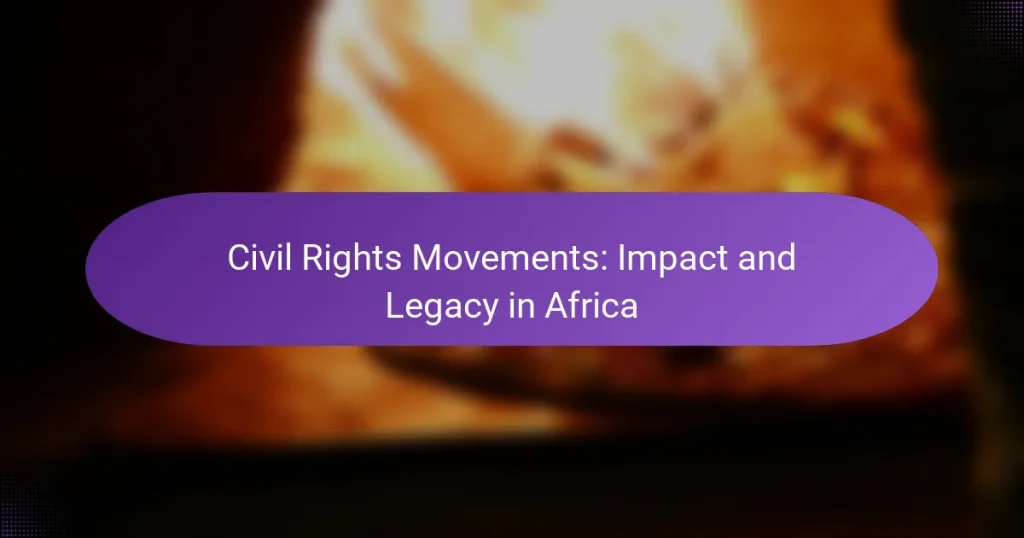Civil rights movements have profoundly shaped modern Africa by championing equality, justice, and human rights for marginalized communities. These movements have not only transformed legislation and social structures but have also played a pivotal role in promoting democratic governance and enhancing human rights protections across the continent.
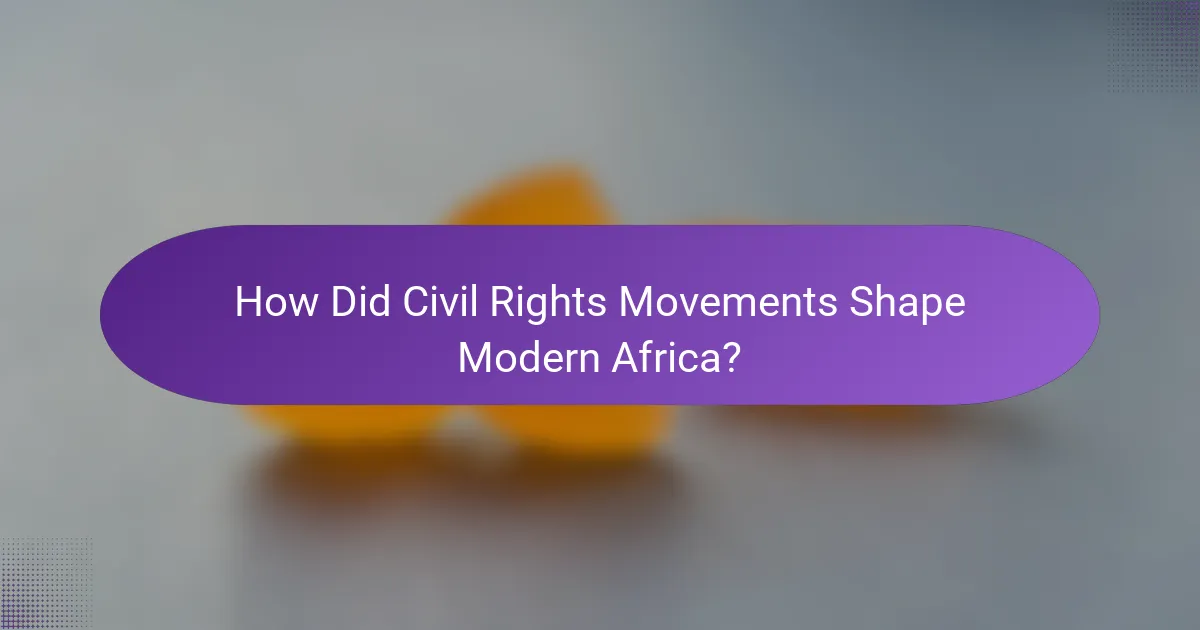
How Did Civil Rights Movements Shape Modern Africa?
Civil rights movements have significantly influenced modern Africa by advocating for equality, justice, and the protection of human rights. These movements have led to substantial changes in legislation, social structures, and the empowerment of previously marginalized communities.
Influence on legislation
Civil rights movements in Africa have played a crucial role in shaping laws that promote equality and protect individual freedoms. For instance, many countries have adopted new constitutions or amended existing ones to include provisions that safeguard civil liberties and human rights.
Key legislation often includes anti-discrimination laws, laws promoting gender equality, and policies aimed at protecting minority rights. These legal frameworks are essential for ensuring that all citizens can enjoy their rights without fear of oppression.
Promotion of social justice
The civil rights movements have been instrumental in raising awareness about social justice issues across Africa. They have highlighted the disparities in wealth, education, and healthcare that exist within societies, prompting governments and organizations to take action.
Campaigns focused on issues like land reform, access to education, and healthcare equity have emerged from these movements. As a result, there has been a growing commitment to address these inequalities, fostering a more just society.
Empowerment of marginalized groups
One of the most significant impacts of civil rights movements in Africa is the empowerment of marginalized groups, including women, ethnic minorities, and the [censured] community. These movements have provided a platform for these groups to voice their concerns and demand their rights.
Through advocacy, education, and community organizing, marginalized individuals have gained greater visibility and influence in political and social spheres. This empowerment has led to increased participation in governance and decision-making processes, which is vital for a more inclusive society.
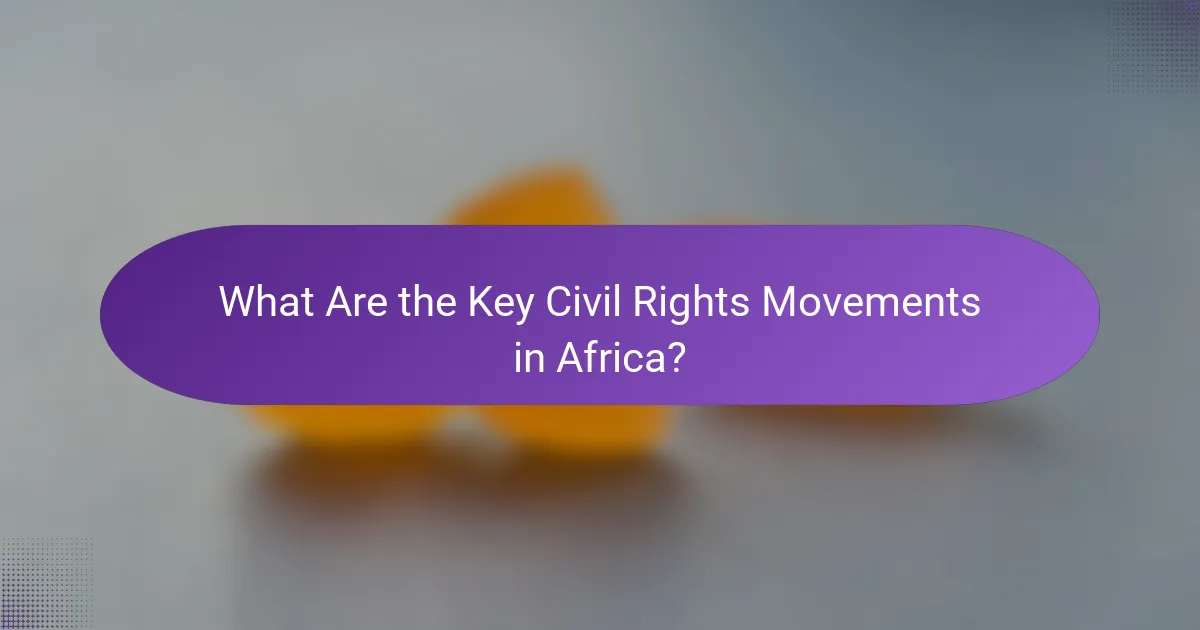
What Are the Key Civil Rights Movements in Africa?
The key civil rights movements in Africa have played a crucial role in shaping the continent’s social and political landscape. These movements focus on advocating for equality, justice, and the rights of marginalized groups, often in response to colonialism, apartheid, and systemic discrimination.
Anti-Apartheid Movement
The Anti-Apartheid Movement was a global campaign aimed at ending the institutionalized racial segregation in South Africa. It gained momentum in the mid-20th century, with notable figures like Nelson Mandela and organizations such as the African National Congress (ANC) leading the charge.
This movement employed various strategies, including protests, boycotts, and international sanctions against the South African government. The culmination of these efforts led to the dismantling of apartheid in the early 1990s, resulting in a democratic South Africa.
Pan-Africanism
Pan-Africanism is a movement that seeks to unify African nations and peoples across the globe, promoting solidarity and cooperation. It emerged in the late 19th and early 20th centuries as a response to colonial oppression and racial discrimination.
This ideology emphasizes cultural, political, and economic collaboration among African countries. Events such as the Pan-African Congresses have played a significant role in fostering a sense of shared identity and purpose among Africans, contributing to independence movements across the continent.
Women’s Rights Movement
The Women’s Rights Movement in Africa focuses on advocating for gender equality and the empowerment of women. This movement addresses issues such as access to education, healthcare, and political representation, which have historically been limited for women in many African societies.
Organizations and grassroots initiatives have been pivotal in raising awareness and driving change. For example, campaigns against gender-based violence and efforts to increase women’s participation in leadership positions are central to this movement’s objectives.
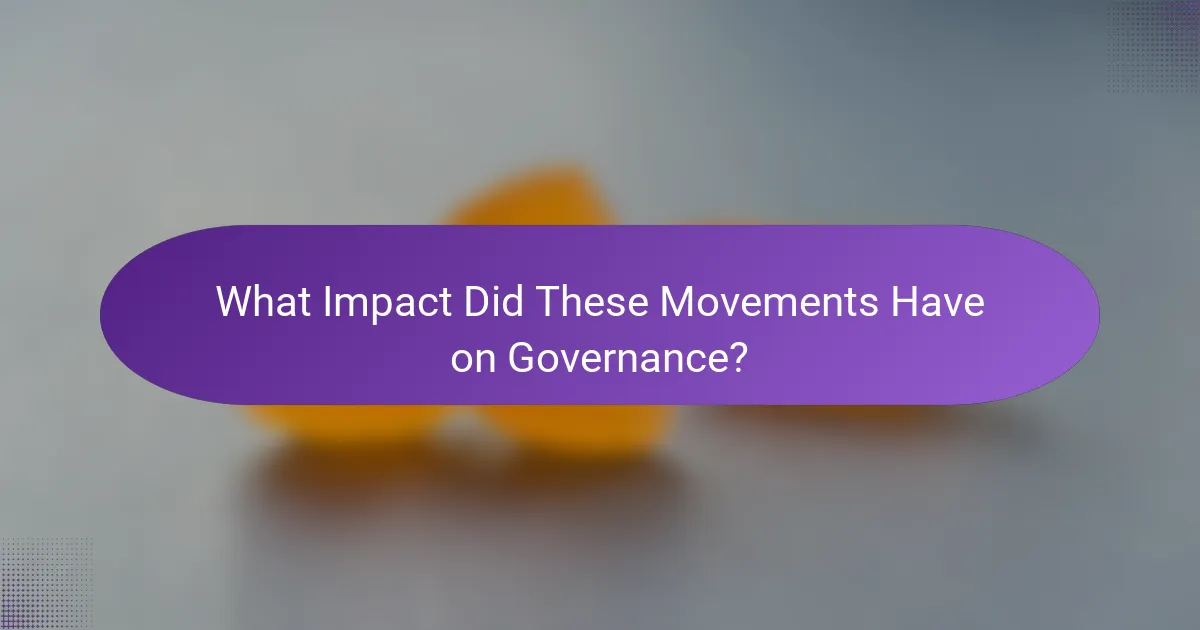
What Impact Did These Movements Have on Governance?
Civil rights movements in Africa significantly influenced governance by promoting democratic principles, enhancing constitutional frameworks, and strengthening human rights protections. These movements have led to substantial changes in political structures and societal norms across the continent.
Democratization processes
The civil rights movements catalyzed democratization processes in various African nations, encouraging the transition from authoritarian regimes to more democratic governance. For instance, movements in South Africa and Kenya have played crucial roles in establishing multiparty systems and increasing citizen participation in political decision-making.
These processes often involve the establishment of electoral systems that allow for fair competition among political parties. Countries that embraced democratization have seen improvements in political accountability and transparency, although challenges such as corruption and electoral violence remain prevalent.
Constitutional reforms
Constitutional reforms driven by civil rights movements have aimed to enshrine democratic values and protect individual freedoms. Many African nations have revised their constitutions to include provisions for free speech, assembly, and the right to vote, reflecting the demands of the populace for greater representation and rights.
For example, Ghana’s 1992 Constitution was a direct result of civil rights advocacy, establishing a framework that supports democratic governance and human rights. These reforms often require ongoing engagement from civil society to ensure that the rights granted are upheld and expanded.
Human rights protections
Civil rights movements have been instrumental in advancing human rights protections across Africa, leading to the establishment of various legal frameworks and institutions. These movements have highlighted issues such as gender equality, freedom from discrimination, and the rights of marginalized groups, prompting governments to take action.
In many countries, national human rights commissions have been established to monitor and address violations. However, the effectiveness of these institutions can vary, and continuous advocacy is necessary to ensure that human rights are not only recognized but actively protected and promoted.

How Have Civil Rights Movements Influenced Economic Policies?
Civil rights movements in Africa have significantly shaped economic policies by advocating for equitable resource distribution and social justice. These movements have led to reforms that prioritize the needs of marginalized communities, ultimately aiming to create a more inclusive economy.
Land reform initiatives
Land reform initiatives have been a crucial aspect of civil rights movements, focusing on redistributing land to those historically denied ownership. These reforms often aim to rectify colonial-era injustices, where land was concentrated in the hands of a few. Countries like Zimbabwe and South Africa have implemented land redistribution programs, which can lead to increased agricultural productivity and economic empowerment for local communities.
However, successful land reform requires careful planning to avoid potential pitfalls, such as decreased agricultural output or social unrest. Policymakers should consider providing support services, such as training and access to credit, to newly established landowners to ensure sustainable development.
Access to education and employment
Access to education and employment has been a focal point of civil rights movements, as these factors are essential for economic advancement. Movements have pushed for policies that promote equal opportunities in education, leading to increased enrollment rates among marginalized groups. For instance, initiatives in countries like Kenya and Ghana have aimed to eliminate tuition fees and provide scholarships to underprivileged students.
Moreover, employment policies have evolved to include affirmative action measures, ensuring that historically disadvantaged populations receive fair representation in the job market. Businesses are encouraged to adopt inclusive hiring practices, which can enhance overall productivity and foster a diverse workforce.
Wealth redistribution efforts
Wealth redistribution efforts are integral to addressing economic disparities created by historical injustices. Civil rights movements have advocated for progressive taxation and social welfare programs that aim to reduce income inequality. In many African nations, these policies are designed to uplift the poorest segments of society, providing them with essential services and support.
To implement effective wealth redistribution, governments should focus on transparent and accountable systems that ensure funds reach the intended beneficiaries. Community engagement is vital to tailor programs that meet local needs and to foster a sense of ownership among citizens, ultimately leading to more sustainable economic growth.
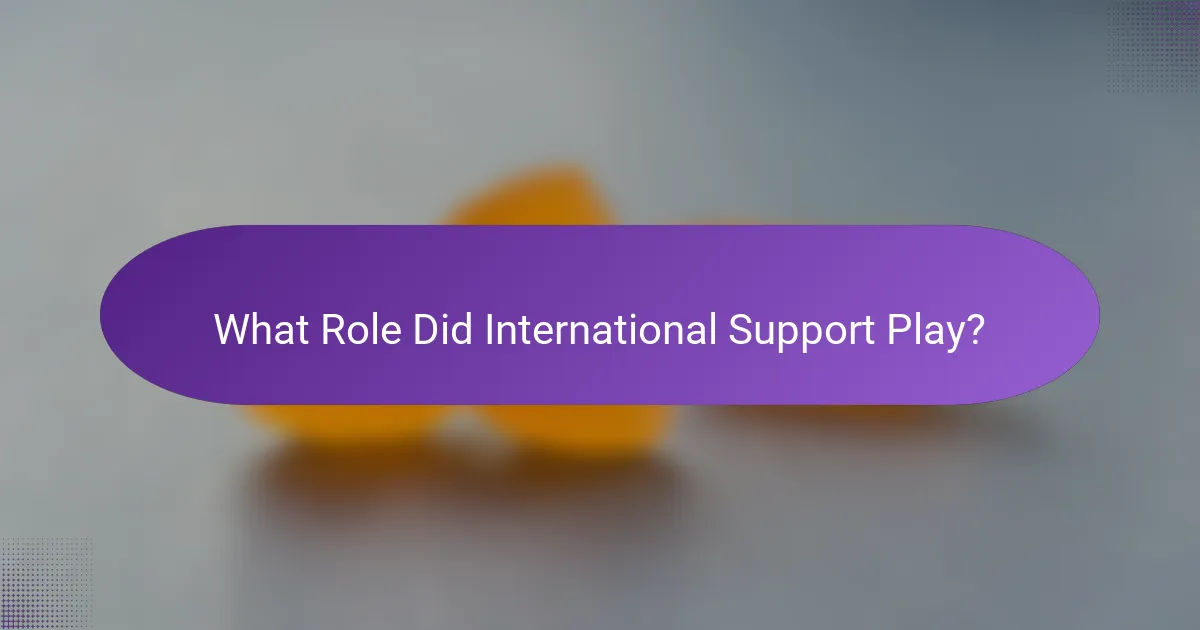
What Role Did International Support Play?
International support was crucial in advancing civil rights movements in Africa, providing essential resources, advocacy, and diplomatic backing. This external assistance helped amplify local voices and pressure governments to enact reforms.
Global advocacy networks
Global advocacy networks mobilized international attention and resources for civil rights causes in Africa. Organizations such as Amnesty International and Human Rights Watch played pivotal roles in documenting abuses and rallying public opinion, which pressured governments to respond to local demands.
These networks often facilitated partnerships between African activists and international allies, creating platforms for sharing strategies and successes. This collaboration enhanced the visibility of civil rights issues and fostered a sense of solidarity across borders.
Funding from NGOs
Funding from non-governmental organizations (NGOs) provided vital financial support for civil rights initiatives in Africa. This funding often covered legal assistance, grassroots organizing, and educational campaigns aimed at raising awareness about human rights.
Many NGOs focused on specific issues, such as women’s rights or anti-discrimination efforts, allowing for targeted interventions. However, reliance on external funding can also create challenges, including potential misalignment with local priorities or sustainability concerns once funding ends.
Diplomatic pressure
Diplomatic pressure from foreign governments and international bodies significantly influenced civil rights movements in Africa. Countries and organizations often used diplomatic channels to advocate for policy changes, leveraging trade agreements or aid packages to encourage compliance with human rights standards.
For instance, sanctions or public condemnations were employed against regimes that violated civil rights, creating a tangible incentive for reform. However, the effectiveness of such pressure can vary, depending on the geopolitical context and the willingness of local governments to respond to international expectations.
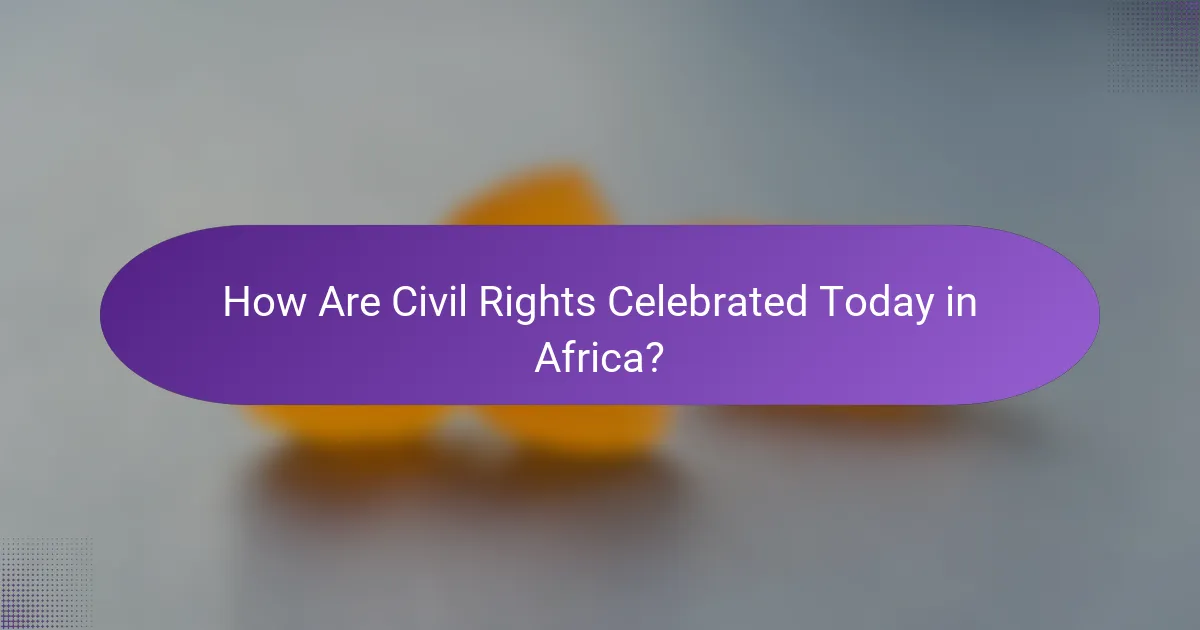
How Are Civil Rights Celebrated Today in Africa?
Civil rights are celebrated in Africa through various events and initiatives that honor the struggles and achievements of past movements. These celebrations serve to educate the public, promote awareness, and inspire ongoing advocacy for equality and justice.
Annual commemorative events
Annual commemorative events play a crucial role in celebrating civil rights in Africa. These events often include marches, speeches, and cultural performances that highlight the history and ongoing challenges of civil rights movements across the continent.
For example, South Africa observes Human Rights Day on March 21, commemorating the Sharpeville Massacre of 1960. Similarly, many countries hold events on International Human Rights Day on December 10, focusing on local issues and achievements.
Engaging with these events can enhance community involvement and encourage dialogue about civil rights. It is essential to participate actively, whether through attendance, volunteering, or sharing information on social media platforms to raise awareness.
